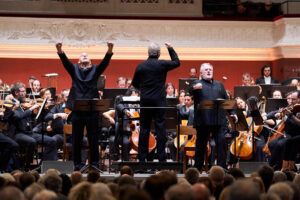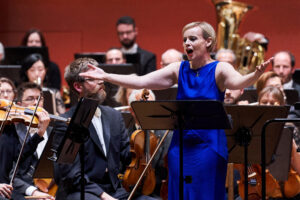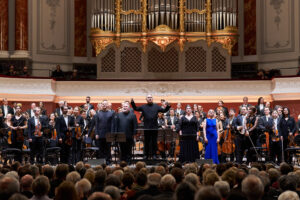“Basel tickt anders” – Basel “ticks” differently from the rest of Switzerland. This picturesque town in a Rhine bend, in an area settled by the Celts in the middle of the first millennium BC, still lives today in its own quiet rhythm – at a crossroads of borders and eras. No great imagination is required to travel back in time here. To a historical as well as mythical past – also to a Wagnerian landscape with a foreshadowing of the twilight of the gods, Wotan’s broken spear and Brunhilde’s awakening. Even without music – let alone with it, when an eminent expert in Wagner’s oeuvre stands at the conductor’s desk of the Sinfonieorchester Basel and conducts the last act of Siegfried with four soloists carefully selected to match his well-though-out and significantly distinctive interpretative vision.
The roots of Basel’s orchestral tradition can be found in the seventeenth century and the concerts organised by the local Collegium Musicum – in collaboration with professional instrumentalists, whom the burghers rewarded with bread and wine from their own cellars. In the 1820s – with a decision to build the Stadtkasino, a new public building in Barfüsserplatz – the Concertgesellschaft, successor to the old Collegium, was established. A permanent orchestra was launched in 1876, when a genuine concert hall was opened in the building. The inaugural evening featured Beethoven’s Symphony No. 9 conducted by Alfred Volkland, the first boss of the Basler Sinfonie-Orchester. At the beginning of the twentieth century the directorship of the ensemble was taken over by Hermann Sutter, whose repertoire featured – alongside his beloved Bruckner’s symphonies – works by Stravinsky, Bartók and Honegger. Over the following seasons artists standing on the conductor’s rostrum in the municipal Musiksaal included Gustav Mahler, Richard Strauss and Felix Weingartner.
Derek Welton (Wanderer), Simon O’Neill (Siegfried), and Sir Mark Elder conducting Sinfonieorchester Basel. Photo: Benno Hunziker
The decision to demolish the antiquated building and replace it with the current edifice of the Stadtkasino was taken at a rather inopportune moment, shortly before the outbreak of the Second World War. The institution’s crisis was not overcome until 1947, when the orchestra returned to Barfüsserplatz from its temporary residence in the Volkshaus. Its renown in the international music world grew with each passing year. In 1997 it was combined with the local radio orchestra, acquiring its present name, Sinfonieorchester Basel. Fifteen years later it emerged from under the wing of its long-time patron, the Allgemeine Musikgesellschaft, and established its own subscription concert series. Since 2016 Ivor Bolton has been the orchestra’s boss, serving at the same time as Music Director of Madrid’s Teatro Real. Both institutions have extended their contracts with Bolton until the 2024/25 season.
British soloists and conductors have been frequent guests in Basel during Bolton’s directorship. They include Sir Mark Elder, who will soon end his collaboration, lasting nearly a quarter of a century, with the famous Hallé, the oldest professional orchestra in the United Kingdom. Polish music lovers know him primarily from the Bregenz Festival recording of Szymanowski’s King Roger featuring Olga Pasichnyk as Roxana. Some may remember that he was music director of the English National Opera in its best years, when the company, currently under threat of closure, was led by a triumvirate of Elder, David Pountney and Peter Jonas. Very few people in Poland know that the young Elder – together with several of his peers, including Anthony Negus, mentioned on this website many times – was one of the most fervent admirers of Reginald Goodall’s conducting and then one of the few continuators of his unique Wagnerian style.
Rachel Nicholls (Brunhilde). Photo: Benno Hunziker
In their interpretations of Wagner’s music both Elder and Negus attach considerable weight to textural details, seeking to achieve an intensity and depth of sound similar to Goodall’s. However, they are pursuing these goals via different routes, as I had an opportunity to find out in Basel, during a concert performance of the Third Act of Siegfried. The distinctive feature Negus’ performances is a vivid pulse combined with freedom of phrasing and subtle but expressive shifts of metric accents in the score. Elder usually sticks to typical “Goodallian” slow tempi, but he adds extraordinary lightness to them thanks to a brilliant interplay of motifs. Such an approach works perfectly in Siegfried, full of contrasts as it is, especially in the final act, in which the conductor, wisely meting out tension, must carry the performers and the listeners from the foot of Brunhilde’s rock to the heights of the sublime; must demonstrate the inner transformation of the Wanderer, who renounces his own will for Siegfried to be created anew; must stress not only the evolution of the two protagonists in the love duet, but also the still existing differences between them. In Elder’s approach the musical narrative is characterised by gradually but consistently meted out drama: dense darkness juxtaposed with dazzling brightness, bloom with fall, defeat with triumph, all culminating and being summed up in Brunhilde and Siegfried’s thrice-repeated final cry of “Leuchtende Liebe, lachender Tod!”.
In Siegfried the Sinfonieorchester Basel felt slightly less at ease than the legendary Hallé, but we cannot forget that Mark Elder does not work with it on the Wagnerian repertoire on a daily basis. Nevertheless, he was able to inspire the instrumentalists to play vigilantly, passionately, with their playing being imbued with the spirit of the story. What also contributed to the success of the enterprise were undoubtedly the two soloists from the original Manchester cast under his baton: with both Rachel Nicholls (Brunhilde) and Simon O’Neill in the title role having had time since to grow into their roles and refine them in terms of pure vocal performance. This applied especially to Nicholls – a truly girlish Brunhilde with a fresh, perfectly controlled soprano, wide open at the top and having an incredibly huge volume. O’Neill’s tenor may not be thick and rich enough for this fiendish role, but I admit in admiration that the New Zealand singer uses it very skilfully, with a masterful sense of phrase and text of the libretto as well as precise diction, intonation and voice production. Erda was sung by the excellent Wiebke Lehmkuhl, whose dark alto shimmering with golden reflections made such an impression on me eight years ago in Berlin, in a harrowing performance of Mahler’s Kindertotenlieder with the DSO conducted by Ingo Metzmacher. The Wanderer as interpreted by Derek Welton was a bit too “youthful”, also because of some vocal shortcomings in the lower register – fortunately, Welton largely made up for them with the beauty of his voice and sensitive interpretation.
After the concert at the Stadtcasino Basel. Photo: Benno Hunziker
The complete recording of Der Ring des Nibelungen with the Hallé Orchestra under Elder, crowned with Siegfried in 2019, still has not caught the attention of music lovers, drowning in a sea of other, often less valuable interpretations of Wagner’s masterpiece. Negus’ interpretations, for which fans have recently been travelling to the other side of the globe, are known only from live performances. And yet Goodall’s legacy is not going to waste. It continues to function in secret. It goes on in some kind of separate undercurrent, cultivated not by passive imitators but by fully conscious successors who enrich their master’s style with their own reflection and experience. This is the case of Sir Mark Elder, who struck the most sensitive chords in the hearts of not only the Sinfonieorchester Basel musicians, but also the listeners, enchanted by his vision. In a city where everything ticks differently.
Translated by: Anna Kijak



